In-depth analysis of the polarization and commonality of encrypted narratives
Original author:kyla scanlon
Compilation of the original text: The Way of DeFi
Original author:
Compilation of the original text: The Way of DeFi
In this article, I will talk about
Crypto Narratives From Inside and Outside the Ecosystem
If you want, you can watch the full version of this article herevideoVersion.
video
Crypto has a narrative problem

I think the issue is pretty obvious to most people - the split of different projects, the denigration of brands launching crypto integrations, the interpretation of cryptobro's role, and of course, the general vibe under any NFT twitter.
Source: CoinersTakingLs
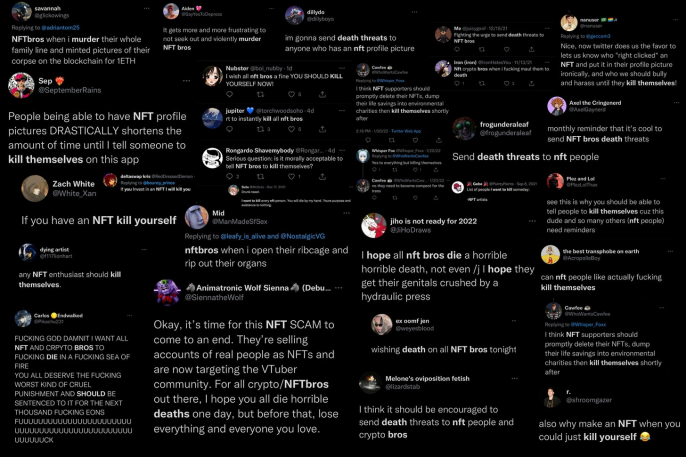
To be honest, sometimes it's scary - people really seem to hate NFTs, elements of the crypto ecosystem, as you can see in the image below (tw: dead).
image descriptionLine Go UpSource: Loop News
A recently published one titled "
’ video, cracking down on crypto very hard. It’s a well-researched piece that delves into what people outside the crypto ecosystem think of those inside it. Sometimes, sometimes the article is too poignant , more of an attack than an analysis, but the core themes that Dan Olson articulates are:
Our systems are crumbling or broken, straining under neglect and destruction, and our leaders seem, at best, willing to ride out the breakdown. We need something better. But not a system that turns everyone into mini-digital landlords, turning all interactions into transactions, or a system that determines the value of something by how salable it is and whether it can be gambled through micro-auctions.
or simply put,Robin SchmidtBuy now, buy in advance, you may be the leader of high technology in the future.
Tim O ReillyThe video is correct in some places (inaccurate in others), but much of the core content of the counterargument, such as from The Defiant
The retorts, like "Yeah, you know, the video is correct, there are elements of cryptocurrency that are based on unsustainable hype — and we're fixing that — but there's a lot of good stuff as well."
Wrote a very good article on web3, mentioning Sal Delle Palme's point of view.""If Web3 heralds the birth of a new economic system, let it be one that increases real wealth - not just paper wealth for those lucky enough to get in early, but life-changing products and services that make life better for everyone.""Currently, Crypto is not interpreted as
real wealth
The thing about narrative is that different people can read the same book and have completely different outcomes.
but
We all see the world through different filters, through different lenses, and that ultimately shapes what we see.
but
I think Line Go Up and Crypto are talking about the same thing, but the difference is that in his video Dan outlines dissatisfaction with the system, which is what Crypto is all about. At the end of the piece, he talks about shrinking opportunities, about isolation, about the future that seems to be disappearing before our eyes - emphasizing that Crypto is not the answer here. But that's also what Crypto is talking about - building a better system.
So, why is there such a divide?
That's why it's important to discuss narrative.
narrative
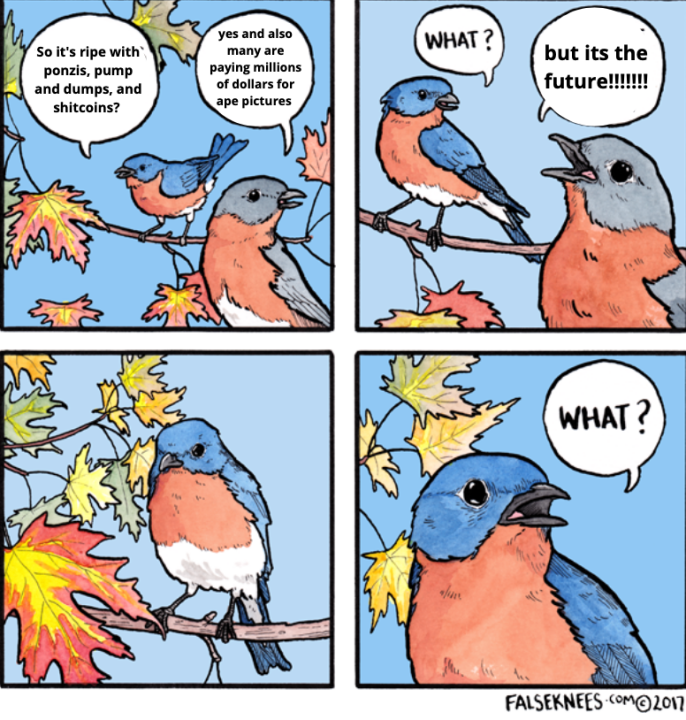
Note: I'm going to make a very broad generalization, so please understand."People Outside the Crypto Ecosystem"
When they see (1) Ponzis, (2) pump-and-dumps, (3) (honestly) absurd allocation of capital to different shitcoins, they say:
Wow, this sucks, why would this be the future?
They know a lot more than shitcoin - but the thing is, shit really stinks. It can be difficult to see beyond these shitcoins - they need to see the underlying power of how cryptocurrencies have and have changed lives, ownership and meaning, and what the underlying technology can bring to ancient industries in terms of efficiency and execution. What is coming.
but
In an imperfect world, you cannot have a perfect solution.
but
Overlap of insiders and outsiders
This can be roughly divided into two distinct groups (simplified of course) -
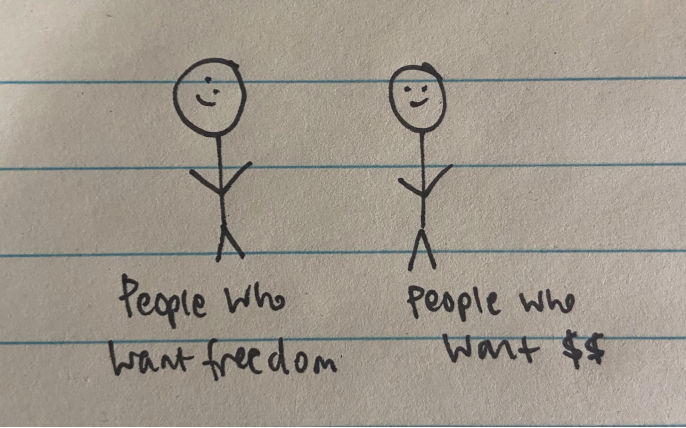
People who want to be free from the system (r/antiwork, FIRE, elements of socialism, etc.).
People who want money (crypto, financiers, VCS, etc.).
*of course* there is intersection between these two groups - quite a bit actually - a lot of people in crypto don't just do it for the money, and a lot of people in the free segment just want a world that feels more hopeful .
Money and freedom are essentially functions of each other.
It's hard to be free without money (that's the truth, for better or worse), and money is often driven to have freedom.
Money and the desire for freedom are both about being able to make the choices you want to make, spend your time the way you want, and get involved in the things you care about, all while knowing that you and your family are safe.
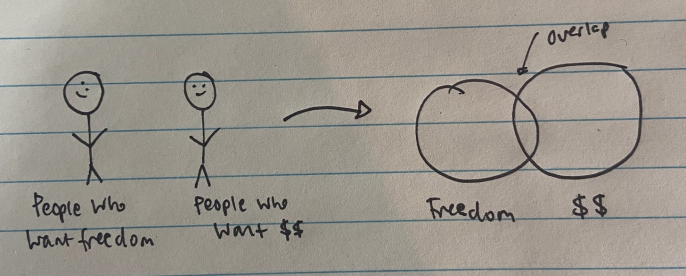
Freedom = f(time allocation, choice, money)
money = f(stability, freedom, choice)
This makes sense. Most people are frustrated with the system, as highlighted in the comments under Dan's video and various encrypted Discords. More and more people are eager to get out of the 40-hour workweek, 9-to-5, in order to have health care, retirement planning, and a lifestyle of commuting only 30 minutes a day. And Crypto is essentially the answer to that question - it's a way for people to at least try to deconstruct a system to make it (on paper) fairer, more accessible, and change the distribution of power.
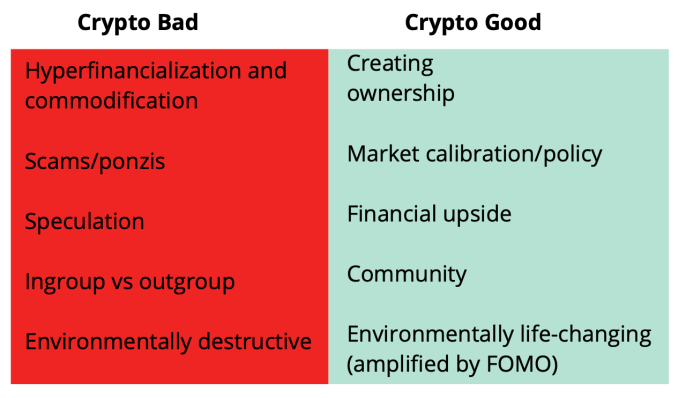
But broadly speaking, it has not been interpreted as such."Crypto Bad"Two Divisions of Cryptographic Narratives"Crypto Good "I want to discuss first
narration, and then
, to emphasize differences in interpretation - Crypto Bad sees hyperfinancialization, while Crypto Good sees the ability to create ownership, etc.
The Narrative of Crypto Bad 😡
People outside the ecosystem see 5 key things when looking at Crypto (again broad generalizations, these are some of the more extreme views).
1) Hyperfinancialization and commoditization (of the soul)
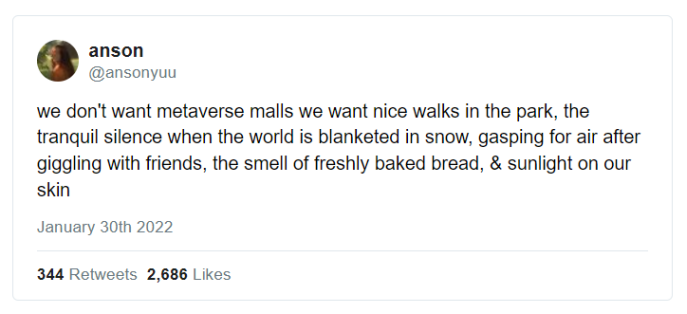
Pay for everything and make everything an investment/speculation object. Do we really need to make everything a microtransaction? Is it at all necessary to break down access into dollars and make every aspect of our lives just another speculative market?
A lot of people want to go back to simplicity - and cryptocurrencies* complicate that."2) Scam/Ponzi"Scams, pump & dumps, rug pulls are definitely one of the most recognizable parts of the crypto ecosystem. Scams are the common denominator. Ponzi economics is a whole different thing,"What is Intrinsic Value besides Numerical Rise?"- when the answer is

No
, so what is it?
3) Speculation
There is a very large gambling problem in modern society. Lotteries are such a paradox (they help fund education), yet gambling is an incredibly harmful and very painful addiction."Crypto seems to encourage massive speculation, which is hard to separate from gambling (some positive expected value)."This atmosphere is very broad, such as
Bet on this coin because Musk might tweet ;) If he tweets, this coin will To the moon
. This narrative is also a thread in the GME/AMC saga -- if we all do, then its price will go up.
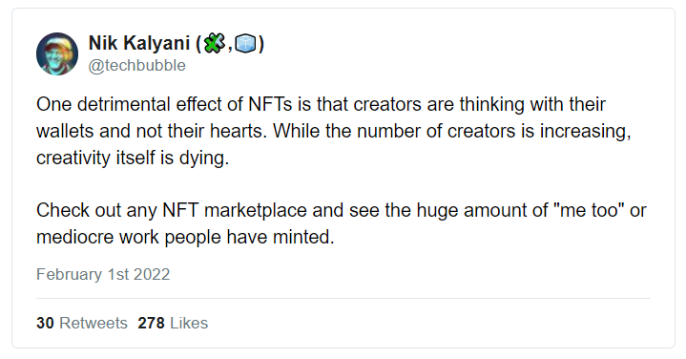
There's an anti-establishment element to the concept of GME/AMC and Crypto, but like ? ? ? Also, what benefits will be brought to society by betting on the rise of mooncoin? (And what is this society?)
There are also many NFT arts that are not so good? It just looks like a gimmicky gamble? In this economy you're paying hundreds of thousands of dollars for a photo of xyz? Ha ha - you can still make money with it?"4) In-group and out-group"they said:
You won't make it (NGMI)
. It's common for communities to adopt their own language (mainly to show who's cool and who's not), and if you get knocked out, well -- good luck getting in because the brain is literally working against you.
5) Environmentally destructive
Earth is on fire? You want us to simply speed up the demise of the planet so you can make $100 on a coin named after a dog?
Also, the stress that cryptocurrency mining puts on an already fragile power grid.
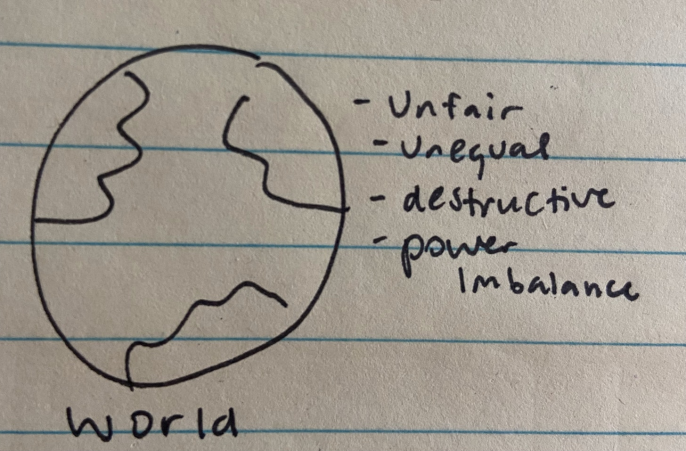
Crypto Bad Narrative Summary
Crypto is a microcosm of the world it was created in - so it's hard not to see influence from legacy systems bleed into new ones. And the current world looks like this to many people:"For many, crypto will only make things worse. (1) The bad things of banks during the GFC would be magnified, (2) the destructiveness of Facebook would be magnified, and (3) the environmental damage of oil producers dumping their products into the ocean would be magnified."
This is the widening gap between rich and poor - but the inner voice that needs to be spoken out is -
I can afford to pay hundreds of thousands of dollars for a picture of a monkey and it sucks that you live paycheck to paycheck.In a world where millions are barely getting by, it's brutal to see that happening. Not saying it's good, bad, or anything else (who knows), but it's the *feeling* of many people.there exists a
lottery society"Line Go Up", but it's not hidden behind a Crypto gas station -- it's for the world to see, and brag about. It's getting rich from things that don't seem to be making the world a better place - which can feel...bad...because for many people the world is already a little...bad.
A one-sentence summary of Crypto Bad and
The whole argument ends up being:
Our system sucks - making our lives a speculative commodity is not the answer.
However, looking at the flip side of this...
The Crypto Good Narrative
Of course, Crypto is not quite like this (of course not, usually nothing is as extreme as we think it is). Before we get into this part, it's very important to emphasize that there are different parts of Crypto (obvious, but still need to be explained). (1) Some are literally just doing it for the money, (2) Others are for the real world use cases of the technology. The 5-point narrative that Crypto thinks is more like:
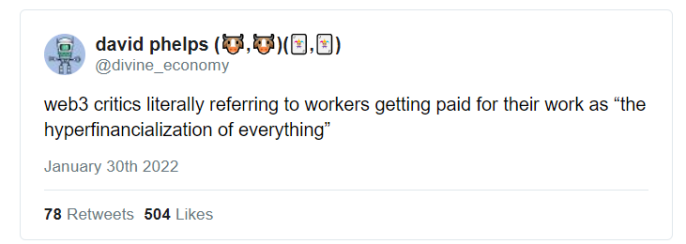
1) Create ownership
By participating in this thing, you get this token, which will allow you to benefit and own the thing you touch. Tokenize it and get its value. Simply benefit from being a human being - which is kind of cool - without paying intermediary fees (decentralization). Get paid for what you do. And build a better world because of it.
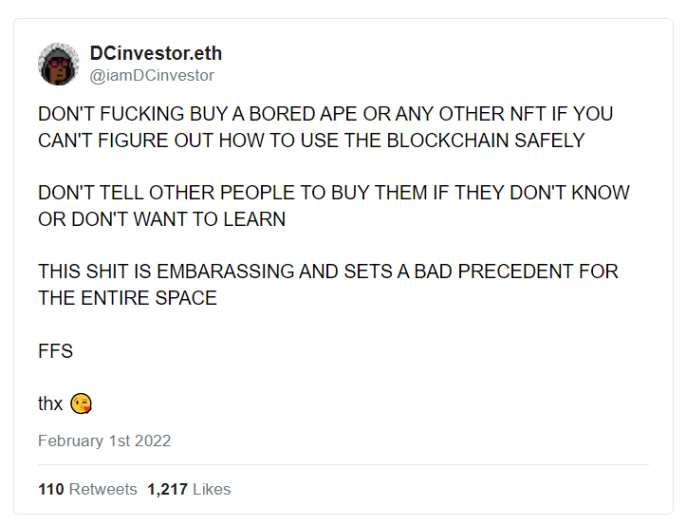
2) Market Calibration
Losing money is part of the learning process :-/
Rug pulls are part of the game. If you invest in enough projects, you will encounter various Rug pulls. People will tilt the table towards them a little bit, and all of a sudden -- you're liquidated. It's not a good thing -- but
Go through enough scams and people will become more discerning over time (hopefully), reducing their effectiveness (again, hopefully -- 2021 numbers look a bit rough)."Vulnerabilities are part of the game too - Wormhole is a very unfortunate example of this."Ponzi games vs. Ponzi schemes: These two are a bit different - we're in the depths of MLM in web2, so of course there will be some Ponzi schemes in web3. The core arguments can be boiled down to: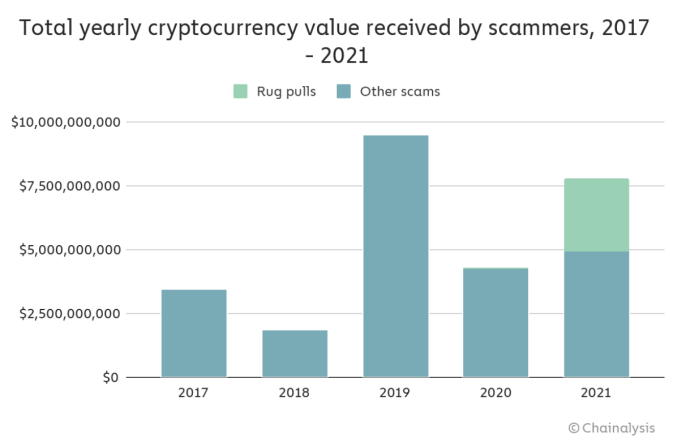
If you HODL, we all HODL, and get very rich". This works great until it fails."Most people know that relying on
More money comes in and prices go up
The token economics of twitter don't *really* work.
2.5) Policy
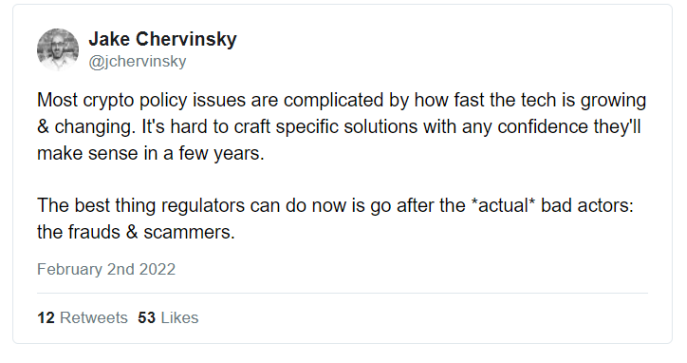
Encryption policy is interesting because it’s a system that tries to calibrate around something entirely new — and politicians don’t know what they’re regulating.
Policing is synonymous with accepting and using elements, which is why this is so important. Crypto wants to be regulated -- but in the right way."3) Financial advantage"If you position yourself right, you can really make a lot of money in this space (and you can lose a lot, the market is a two-way street). so people say,
Hey, why not take part in this pretty cool opportunity and make some money beyond what I'm making as a worker?
Literally, why not?
However, the * market is an interactive * on both sides. It's a zero-sum game -- all markets are. Some end up being liquidity for exit (much like the slowest antelope getting eaten by a lion). This is not the main goal (usually?), but a function of the circumstances many fast and furious projects face.
Plus, you get to enjoy the financial upside too -- Dune Analytics just raised $69,420,000 (because they can, and life's a meme). Everything is simple sarcasm and self-deprecation. Don't take yourself too seriously, because at this point - you *really* don't understand how it all works.
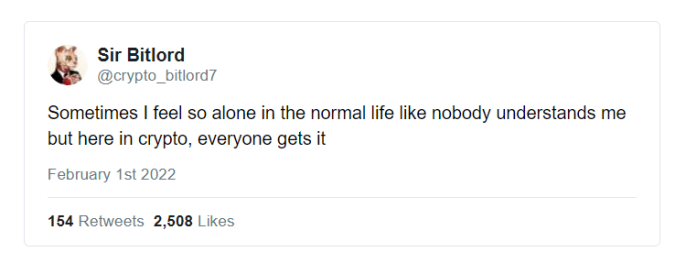
4) Community
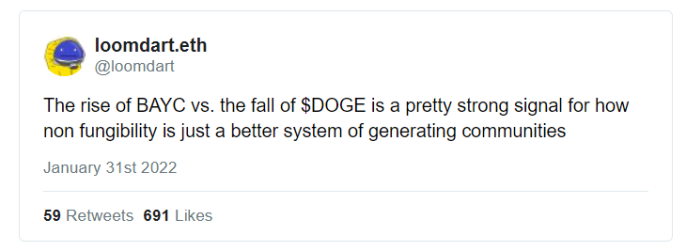
The value of Crypto lies in the people in it. People build together - L2 scaling features make Ethereum more accessible, they build Ethereum alternatives, they overdo Doge, they buy Bored Ape - what all of these have in common is the concept of community.
This is what Crypto offers too - a derivative of religion, a place where people feel valued and respected.Zeneca5) Life changing environment (amplified by FOMO)"this is from"Thoughts surrounding regret and missing out on certain deals. He sums up the existing FOMO very well --
Ah, I didn't get in the car, so all the riches will be lost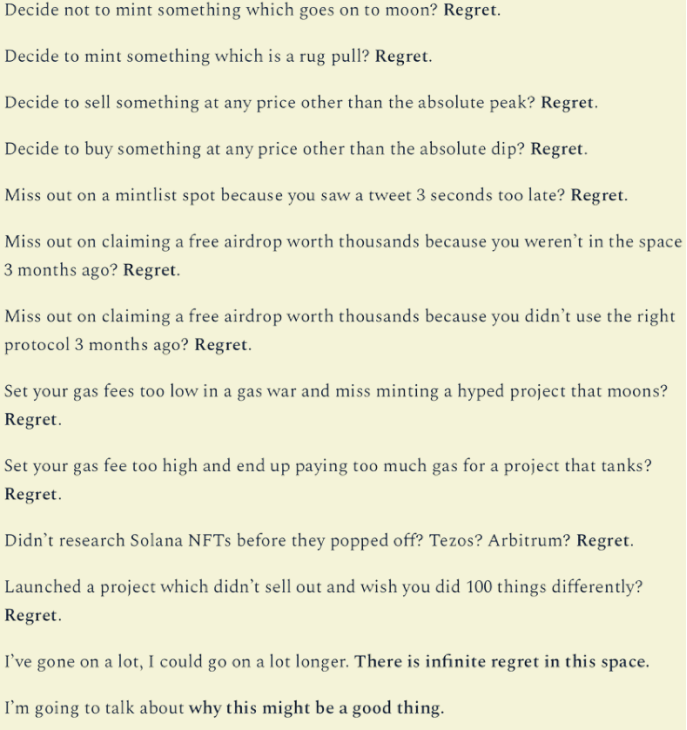
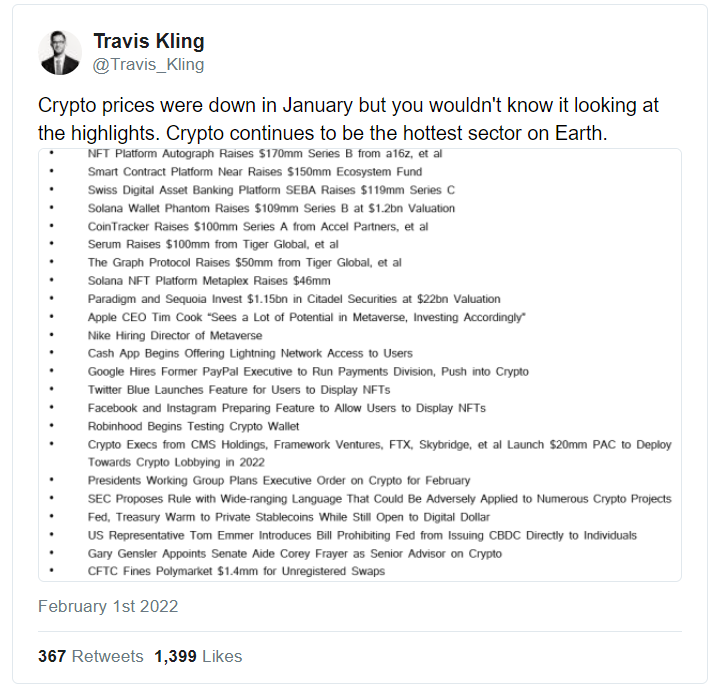
-- while also emphasizing how much wealth is out there.
And *seems* everyone is in FOMO, or at least embracing the environment. The lines between web2 and web3 are starting to blur and innovation and investment are everywhere.Crypto Good Narrative SummaryThe Crypto Good narrative is about access and opportunity, about creating paths for those who didn't before, about this common purpose of connecting the world to something that truly *owns* it. It's about taking power away from social platforms, it's about"David defeats Goliath"(no sarcasm,
show the power of his god

, which is to some extent the narrative of Crypto).
It's about creating community (chaotic though it may be, and that's okay!) and changing the world. For better development.
Closing the ever-widening wealth gap. Offer alternatives. Don't let the power dynamics become so tilted that it's almost impossible to rebalance the scales.
A one-sentence summary of Crypto Good is:
Our systems suck - and we have choices about how we protect, own and benefit from the world around us.
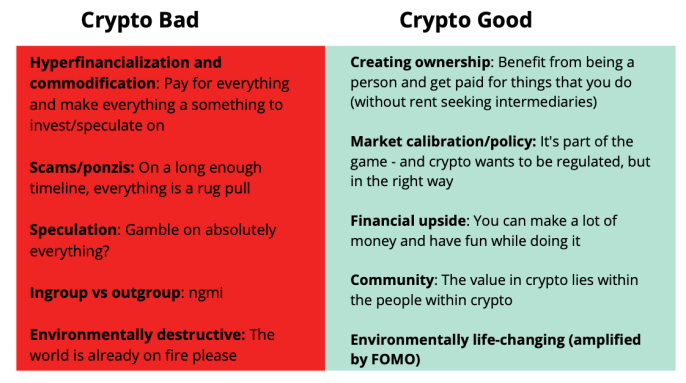
Narrative Interpretation
However, both of these statements are very extreme interpretations.articleI wrote about narrative a few weeks ago
article
, and the problem with narrative interpretation of web3:
As a result, the narrative of what web3 might be - which is likely to be a net benefit to most people - is skewed. It could be thought of as a fair, cooperative, accessible world, but it is not. From an outsider's point of view, the narrative isn't being read in the right way. Most people still see crypto as a get-rich-quick model for the already rich, and that's not...appealing. This can actually be broken down into two main threads: 1. Economic change: Crypto will change the way the economy works, digitize everything, allow us to own everything, and change the way we work and play, etc.
2. The Ponzi economy: This is really just a corridor of wealth that makes the rich richer and leaves everyone else behind.It's always *about* perception. This is a question about narrative. Everything ends up being a by-product of how people interpret it.If you zoom in on either of these arguments, you'll see that both are flawed. Crypto is not perfect (nothing is perfect) and requires a large tech stack to really penetrate deep into the ecosystem. The democratization of wealth is ambiguous. as
Matt Levine
Written by:
The crypto ecosystem is a stack of blocks - we can see the interpretation of the narrative play out here. It is made up of brands, financial institutions and other aspects.
brand
narrative in action
brand
Brands want to be part of it, they want to stay relevant. As such, the brand develops NFT items and builds within the Nike metaverse, and even attempts to become the incongruous metaverse itself (which has certainly had an effect on their recent gains). It's about testing the ecosystem (and for Zuckerberg, controlling it) to figure out how they can leverage technology and allow fans to engage with them. This is a function about the following two points, including:
Relevance: might as well keep up with the cultural trend and make some NFTs.
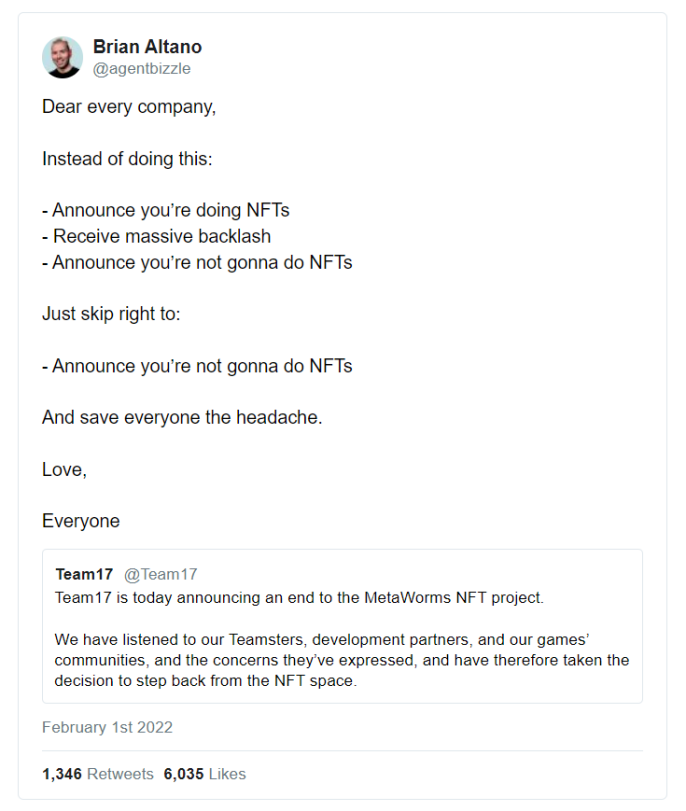
The Future: Attention is one of the most valuable commodities in the world. If you can figure out how to take advantage of this, you can buy yourself even more opportunities into the never-ending vastness before us.
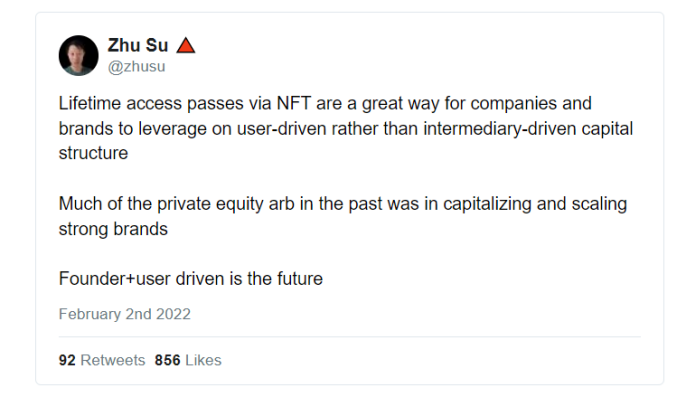
This could go very well, or it could go very badly.
But at the same time...
See, this is confusing.
Financial InstitutionsCoin CenterTraditional financial institutions and venture capitalists.
Tradfi
Note: regulation of financial institutions and cryptocurrencies is a whole different story (see
for more information).
So these guys love to make money. They are currency experts, they know the flow, they know the system, they understand it. They specialize in researching the market, finding the differences, and really making Line Go Up.
So yes, they will be entering the crypto space. That's in their DNA - derivatives, leverage, yield farming, etc. with huge upside? And they've now entered the crypto ecosystem (BlackRock is launching a blockchain ETF, while the pursuit of spot ETFs has long since stalled). They see a financial opportunity here.
The Ontario Teachers’ Pension Plan invested in FTX’s most recent funding round — a huge sign that institutions have come to the fore (and they’ve been). Here are a few reasons:"Earnings: It is very difficult to make money in certain parts of the market. Bonds are basically weakened cash reserves, and some stocks have risen a little too much with no future returns in sight (maybe?), which is tough for the typical stock picker. So they need yield - and cryptocurrencies are yield! And it doesn't matter if it trades like Nasdaq right now."Diversification: it's all about yield - and cryptocurrencies are right
Wow, is everything Apple/Google/Facebook?
answer. It provides the opportunity to reduce the overall concentration of funds and portfolios, which is second to none in the financial sector."Financial Upside: Including Gains - Cryptocurrencies have changed the fortunes of many people. It's a matter of probability -- make a few odd bets here and there, and someone might be a winner (this is the exact definition of venture capital, which I'll get to later)."This is basically the narrative financial institutions have for investing in cryptocurrencies.
venture capital
IIThis articleWrote about this question last week, but VCs like
This article
written.
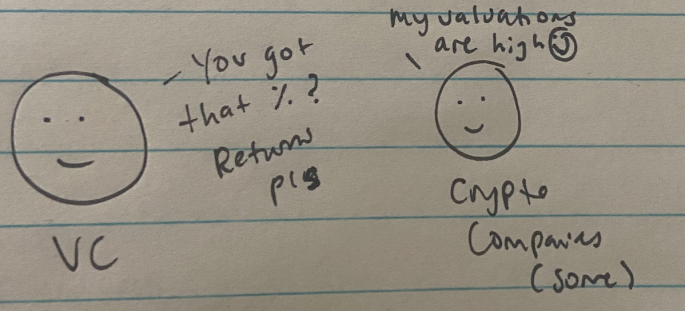
Crypto and high-speed technology have a lot of venture capital funding, Wall Street funding, and global macro narrative funding. Because of this, these funds move according to the risk assessment of their holders - which means that cryptocurrencies end up trading like big tech companies, with many risks and cyclical movements of risks.
That's not a bad thing -- it's just how the market is pricing in the risk it sees.
Venture capital funds are flowing in - a large amount of venture capital funds, pushing projects to a valuation of 100-200 million US dollars, putting pressure on the entire market before products, ideas and outputs.
VCs are an interesting player in this space - sometimes they are enemies, sometimes they are friends, but what they have in common is that they are financiers, offering to (seemingly) anyone who has a tokenized revenue model and is on the pitch Mentioning web3 offers millions of dollars. The awkward/necessary thing about VCs is that they're after returns. The reason they invest is Line Go Up - they can throw spaghetti against the wall and see what sticks, but their main goal is to be able to have a solid exit.
In the context of FOMO and hype, returns drive investment. They invest in cryptocurrency companies because of the built-in expectation that one day they will get a lot of money, and that makes everyone happy. Of course, not every company does this (most don't), but the ones that do make it all worth it.
Venture capital is speculative -- it's either a bet on the founders, or a bet on the idea itself. And these small bets are an infusion of capital that is now setting a floor for the entire space.
Quick Thoughts on the Fed
There are other factors - including, of course, the Fed - or what the Fed stands for. This has been very evident over the past few weeks as stocks and cryptocurrencies have pretty much lost their minds throughout January as the Fed announced that they were indeed going to raise interest rates (and they meant it this time!). Cryptocurrencies became a beta for tech stocks -- and that crushed the whole diversification narrative.
The Fed declared it was time to tighten economic conditions, things are no longer easy - so people reallocate out of tech/crypto and into hardcore players like energy and utilities.
Until they rotate back -- because we're living in a cycle after all.
But the market is quite uncertain right now - we can see this in the VIX index, subdued capital inflows, and general market movement. Things like geopolitical risk, whether the economy is actually okay, general speculative bubble concerns -- hey, things are tricky, to say the least. In this case, several things complicate the situation, all of which also affect cryptocurrencies:
Energy Markets: In my opinion, cryptocurrencies have quite a few risks here that are often under-discussed. The chain of blackouts in Central Asia and Russia does not bode well for stable energy supplies. OPEC held a 16-minute meeting where they agreed to increase output by 400,000 barrels per day in March - but concerns about underproduction, underinvestment and resource constraints are strong.
Speculative exhaustion: If energy prices start to inflate (like real inflation), this will help achieve the Fed's goal of contracting the economy (#efficiency). Speculative dollars are funneled back to less speculative assets like oil, popping the entire speculative bubble. so. This can be a bad thing.
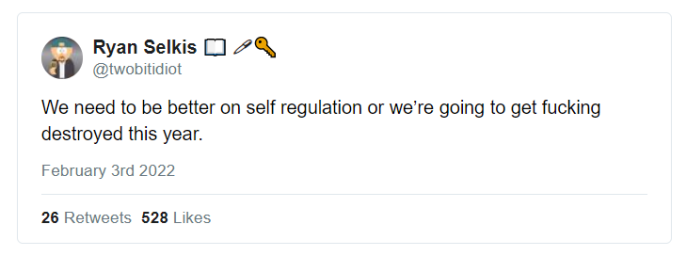
narrative summary
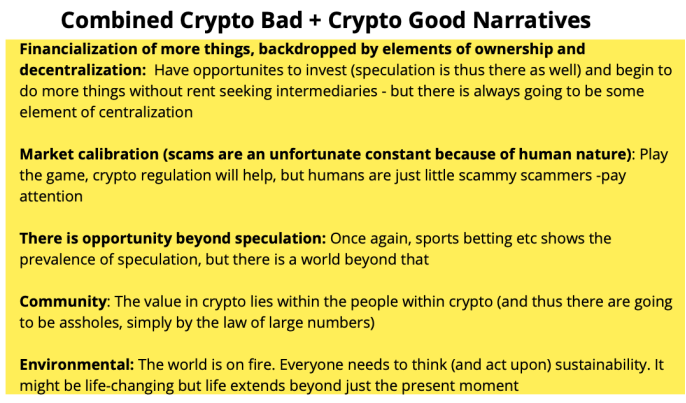
Well, the point is, Crypto realizes where it needs to improve -- and there's more overlap between its bad and its good than I think people realize.
So I think it looks more like this:
Yes, there is the financialization of more things, but behind it is an element of ownership and decentralization.
Market Calibration - Due to human nature, scams are an unfortunate norm.
An opportunity to go beyond speculation and own a real investment.
Community - People do make crypto valuable, but there are assholes everywhere. Please avoid those jerks.
Environment - The world is on fire. We must have sustainable energy. This goes beyond cryptocurrencies and directly concerns policymakers.
We must consider life-changing opportunities, but we must also consider life beyond the moment.
Of course, this is a rather subjective and very qualitative analysis of the ecosystem.
Markets are both qualitative and quantitative. The market somehow reflects the world we want to see - we invest in companies that we hope will do the world good (most of the time...).
"There is a palpable displeasure with the way the world is going, both inside and outside of crypto. The fact that we're bringing back coal production, we *still* have workers' rights issues, we simply can't think about how to have health care in America - it's like"
so
Is the world just one giant shitcoin?
so
How do you do it? Where do you find hope and meaning?Casey NewtonWe have two groups that actually have relatively similar goals (crypto bad and crypto good), but have different interpretations of the narrative (and technology, process, etc.) needed to get there.Molly WhiteThere are many things Crypto can do to improve people's perception of it-
A few were highlighted - including making transactions more reliable and implementing scaling schemes (faster) (people are working on it). he emphasized
Article on the importance of cleaning up privacy concerns on the blockchain.CobieThere is the hype part of the narrative (this could be the future) and there is also the reality (this is the future).
Both crypto-skeptics and crypto-enthusiasts have valid points - maybe hyper-financialization to the point where we have to pay to unlock our coffee makers and toothbrushes (as
pointed out) is bad.
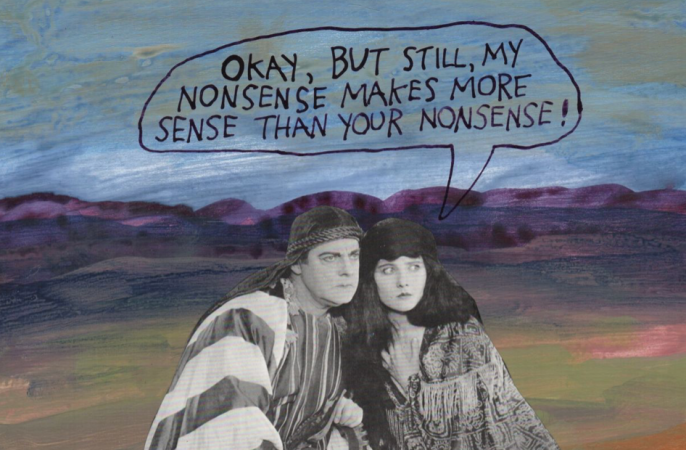
But the idea that we can build a better future that allows access, seizes opportunity, and benefits from a system that used to be very conservative -- that's pretty good. It's just how we see it -- and ultimately, how we implement it.



